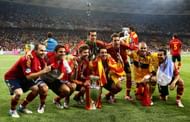“That’s how it is with legends. The greater they sound, the more must’ve got left out.” - Tim Tharp,Knights of the Hill Country
There is something about present triumphs that seem to cloud out the past and whatever bitter tastes any association with it may bring. As much as one desires to be comforted by the security success brings, a pensive look back is warranted. Because, as Tim Tharp observes in this quote from his book, the fables and myths we create around our greatest legends are misleading sometimes. Maybe they weren’t always legends – maybe something got left out.
“There is flair in everything the Spaniards do in life”, claims Vishwanathan Anand. From the mighty conquistadors to their everyday cooking, Spain has been emblematized as a nation oozing with flair. As for me, I will always associate the word ‘gusto’ with Spanish football. Everyone who fought off sleep to watch the finals of the last World Cup knows exactly what I’m talking about.
Watching Iniesta take off after scoring that extra time goal; the swarm of ecstatic Spanish players and coaching staff making a bee line for Iniesta; bodies piling up on top of the midfielder near the corner spot; the deafening crowd, the disconsolate Dutch contingent. As much as I try to fight it, even thinking about it gives me chills. But that’s towards the concluding end of our story. Let me start from the beginning.
Spain became a member of FIFA in 1904, despite the fact that the Spanish Football Federation was first established in 1909. The national team debuted in 1920. Since then, the team has participated in thirteen of nineteen FIFA World Cups and nine of fourteen European Championships.They registered their first international victory in the Olympic games with a 1-0 win against Denmark. In the 1934 World Cup, which was Spain’s first, a 3-1 triumph against Brazil was the only positive outcome they earned. Civil and World Wars then forced the team into a prolonged hiatus.
Spain won its first major international title in the form of the 1964 European Championship, which they hosted. A highly favoured Hungary side was stunned 2-1 in the semi finals of the tournament. The Soviet Union would be the final hurdle between Spain and its first cup. In the finals, Marcelino’s 84th minute goal broke the 1-1 deadlock and so, 44 years after playing its first game, the Spanish team had won an international tournament .
What followed was another 44 year epoch – another drought. It was during this period that La Roja (“The Reds”) earned the infamous tag of being perennial underachievers. A number of great players had passed through the team’s ranks and to be fair, their statistics weren’t that bad at all. These factors only led in strengthening their image as being under-performers. The only respite came when Vicente Miera’s Spanish side struck gold at the 1992 Barcelona Olympics. But exclusive footballing glory still eluded them. To many, Spain was just a team that had a good future in the past.
It was with the burden of this history of liabilities hanging over its head that the Iker Cassilas led Spain side began its Euro 2008 campaign. The run up to the finals was absolutely flawless. They had qualified for the tournament itself at the top of their group. Once through, the side won all of its games in Group D, including a match where they managed to upstage defending champions Greece.
What followed was even more impressive. In a cliffhanger of a match, which ended in a penalty shoot out, Spain overcame defending champions Italy. Then in the finals against Germany, Fernando Torres‘ 33rd minute goal turned out to be the decider. In this fashion, Spain conquered Europe once again.The world was next. And another European crown.
With those wins, Spain became the first team in history to win three international tournaments in succession. The team came to be known as the Golden generation. They aren’t just the La Roja anymore, they were the La Furia Roja (The Red Fury). Comparisons have been drawn up between the Brazilian World Cup winning team of 1970 and Rinus Michels’ Netherlands side of 1974. These discussions never reach a conclusive end. But in effect, what they do is put Spain in the rarefied company of some the greatest teams in the history of the sport.
Spain end 2012 at the top of the FIFA world rankings, earning themselves the title of “Team of the Year” for the fifth time in succession. The rankings are based on the results of 900 matches throughout the year, more than half of which were friendlies and almost a third of which were qualifiers for the 2014 World Cup in Brazil. As was the case in Euro 2008, Germany remain their closest contenders. It would be safe to say they aren’t underachievers any more. And for the sake of football, we hope it stays that way.


